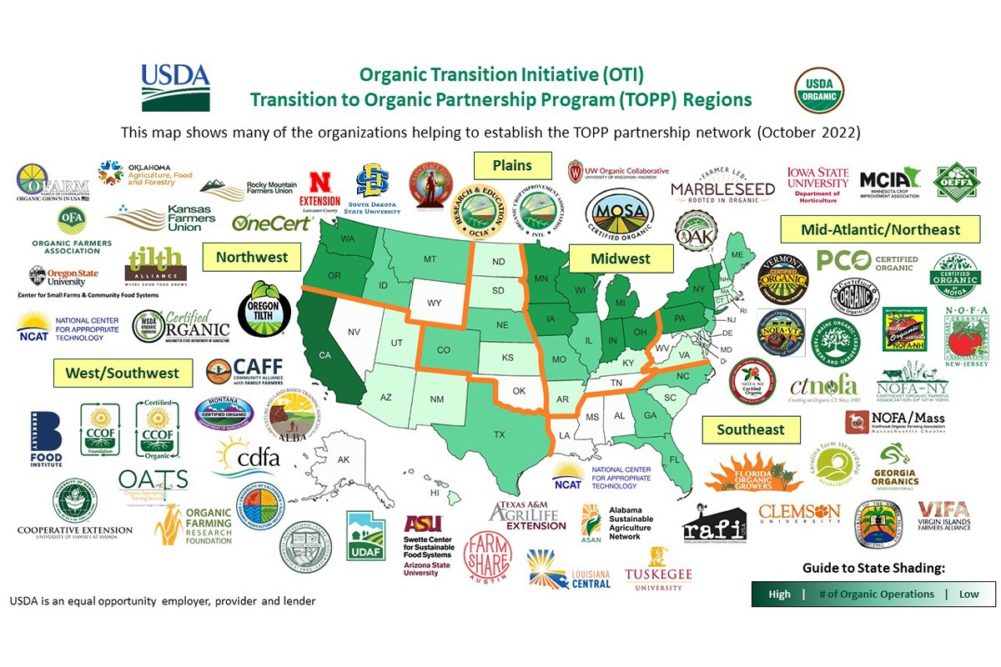
Are you a producer thinking about transitioning to organic production? This webpage is for you. Here you’ll find information about our Transitional program for growers and livestock producers. We’ll also introduce you to the Transition to Organic Partnership Program (TOPP).
A transitional grower is a crops producer transitioning to organic as part of the United States Department of Agriculture (USDA) Organic Transition Initiative (OTI) Transition to Organic Partnership Program (TOPP). These transitional producers have an organic system in place, are implementing practices that are expected to lead to compliance with the USDA organic regulations (organic rules), and are not using prohibited substances.
A transitional livestock producer is transitioning to organic livestock production practices as part of the United States Department of Agriculture (USDA) Organic Transition Initiative (OTI) Transition to Organic Partnership Program (TOPP). Only dairy animals may go through a one-time transition to organic milk production which must occur as part of the operation’s Organic System Plan and with certifier oversight.
2. Submit your Transitional Production Plan to a certifying body, such as QCS, for review.
If an operator applies for transitional certification, they cannot label their products organic until they receive an organic certificate from an accredited certifying body, such as QCS. Getting a transitional certification does, however, allow operators to show their customers that they are using organic practices while they complete a transitional period.
Below are applicable regulations from the National Organic Program’s organic regulations. Click the links to see each citation.
Land Requirements (7 CFR 205.202)
(a) Have been managed in accordance with the provisions of §§ 205.203 through 205.206;
(b) Have had no prohibited substances, as listed in § 205.105, applied to it for a period of 3 years immediately preceding harvest of the crop; and
(c) Have distinct, defined boundaries and buffer zones such as runoff diversions to prevent the unintended application of a prohibited substance to the crop or contact with a prohibited substance applied to adjoining land that is not under organic management.
Dairy animals (7 CFR 205.236(a)(2))
(2) Dairy animals. Subject to the requirements of this paragraph, an operation that is not certified for organic livestock and that has never transitioned dairy animals may transition nonorganic animals to organic production only once. After the one-time transition is complete, the operation may not transition additional animals or source transitioned animals from other operations; the operation must source only animals that have been under continuous organic management from the last third of gestation.
Eligible operations converting to organic production by transitioning organic animals under this paragraph must meet the following requirements and conditions:
(i) Dairy animals must be under continuous organic management for a minimum of 12 months immediately prior to production of milk or milk products that are to be sold, labeled, or represented as organic. Only certified operations may represent or sell products as organic.
(ii) The operation must describe the transition as part of its organic system plan. The description must include the actual or expected start date of the minimum 12-month transition, individual identification of animals intended to complete transition, and any additional information or records deemed necessary by the certifying agent to determine compliance with the regulations. Transitioning animals are not considered organic until the operation is certified.
(iii) During the 12-month transition period, dairy animals and their offspring may consume third-year transitional crops from land included in the organic system plan of the operation transitioning the animals;
(iv) Offspring born during or after the 12-month transition period are transitioned animals if they consume third-year transitional crops during the transition or if the mother consumes third-year transitional crops during the offspring’s last third of gestation;
(v) Consistent with the breeder stock provisions in paragraph (a)(3) of this section, offspring born from transitioning dairy animals are not considered to be transitioned animals if they are under continuous organic management and if only certified organic crops and forages are fed from their last third of gestation (rather, they are considered to have been managed organically from the last third of gestation);
(vi) All dairy animals must end the transition at the same time;
(vii) Dairy animals that complete the transition and that are part of a certified operation are transitioned animals and must not be used for organic livestock products other than organic milk and milk products.
The Transition to Organic Partnership Program (TOPP) is a network assembled by the USDA’s National Organic Program to support transitioning and organic producers with mentorship and resources. The program consists of six regions working together nationwide towards the goal of growing the network of organic producers.
With TOPP, producers transitioning to organic will find support through the transition and certification process. Mentorship, workshops, webinars, field days, technical assistance, and other educational events will offer opportunities to learn about organic production, the certification process, market opportunities, and more.
Find your region on the TOPP website and learn more about mentorship, events, and resources!

Please complete the form below. We'll send our answer straight to your inbox.
